Analysis of Health and Social Care Principles Report - Module 1
VerifiedAdded on 2020/01/15
|14
|4101
|159
Report
AI Summary
This report delves into the fundamental principles of Health and Social Care (HSC), emphasizing their significance in guiding care workers to provide quality care. It explores the applicability of support principles, such as promoting individual rights, respecting cultural values, and implementing anti-discriminatory practices. The report analyzes the benefits of a person-centered approach, highlighting its positive impact on improving the quality of life, self-esteem, and reducing agitation among service users. Procedures for protecting clients from harm, including the importance of interpersonal working and staff training, are also discussed. Furthermore, the report examines ethical dilemmas, such as those arising from conflicting religious beliefs, and the implementation of policies, legislation, and codes of practice, including the Health and Social Care Act 2012. The development of local policies in accordance with national requirements and their impact on organizational policies are also considered, along with the influence of social processes and theories on HSC practices. The report concludes with a portfolio of case studies and references, providing a comprehensive overview of HSC principles and practices.

PRINCIPLES
OF HSC
OF HSC
Paraphrase This Document
Need a fresh take? Get an instant paraphrase of this document with our AI Paraphraser
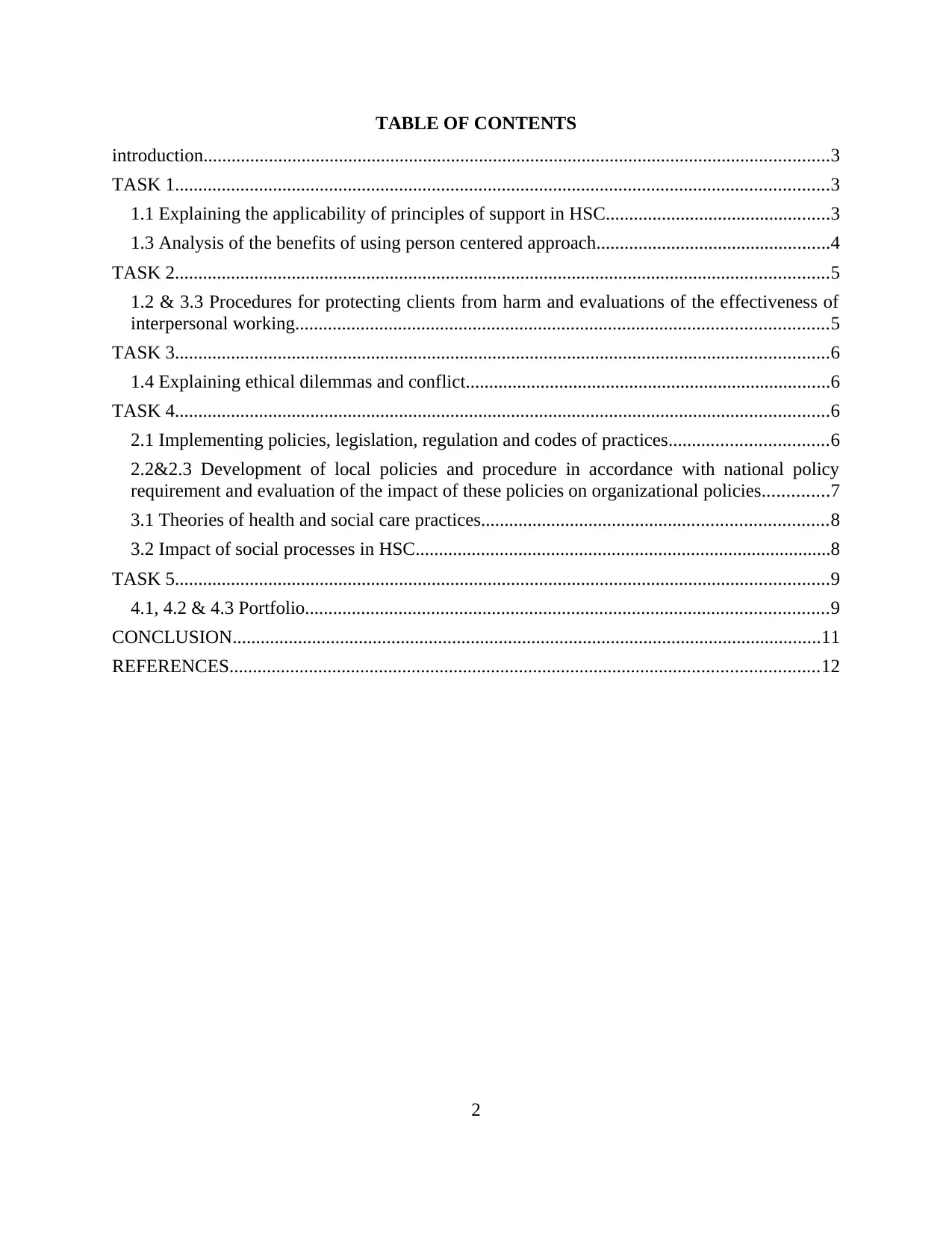
TABLE OF CONTENTS
introduction......................................................................................................................................3
TASK 1............................................................................................................................................3
1.1 Explaining the applicability of principles of support in HSC................................................3
1.3 Analysis of the benefits of using person centered approach..................................................4
TASK 2............................................................................................................................................5
1.2 & 3.3 Procedures for protecting clients from harm and evaluations of the effectiveness of
interpersonal working..................................................................................................................5
TASK 3............................................................................................................................................6
1.4 Explaining ethical dilemmas and conflict..............................................................................6
TASK 4............................................................................................................................................6
2.1 Implementing policies, legislation, regulation and codes of practices..................................6
2.2&2.3 Development of local policies and procedure in accordance with national policy
requirement and evaluation of the impact of these policies on organizational policies..............7
3.1 Theories of health and social care practices..........................................................................8
3.2 Impact of social processes in HSC.........................................................................................8
TASK 5............................................................................................................................................9
4.1, 4.2 & 4.3 Portfolio................................................................................................................9
CONCLUSION..............................................................................................................................11
REFERENCES..............................................................................................................................12
2
introduction......................................................................................................................................3
TASK 1............................................................................................................................................3
1.1 Explaining the applicability of principles of support in HSC................................................3
1.3 Analysis of the benefits of using person centered approach..................................................4
TASK 2............................................................................................................................................5
1.2 & 3.3 Procedures for protecting clients from harm and evaluations of the effectiveness of
interpersonal working..................................................................................................................5
TASK 3............................................................................................................................................6
1.4 Explaining ethical dilemmas and conflict..............................................................................6
TASK 4............................................................................................................................................6
2.1 Implementing policies, legislation, regulation and codes of practices..................................6
2.2&2.3 Development of local policies and procedure in accordance with national policy
requirement and evaluation of the impact of these policies on organizational policies..............7
3.1 Theories of health and social care practices..........................................................................8
3.2 Impact of social processes in HSC.........................................................................................8
TASK 5............................................................................................................................................9
4.1, 4.2 & 4.3 Portfolio................................................................................................................9
CONCLUSION..............................................................................................................................11
REFERENCES..............................................................................................................................12
2
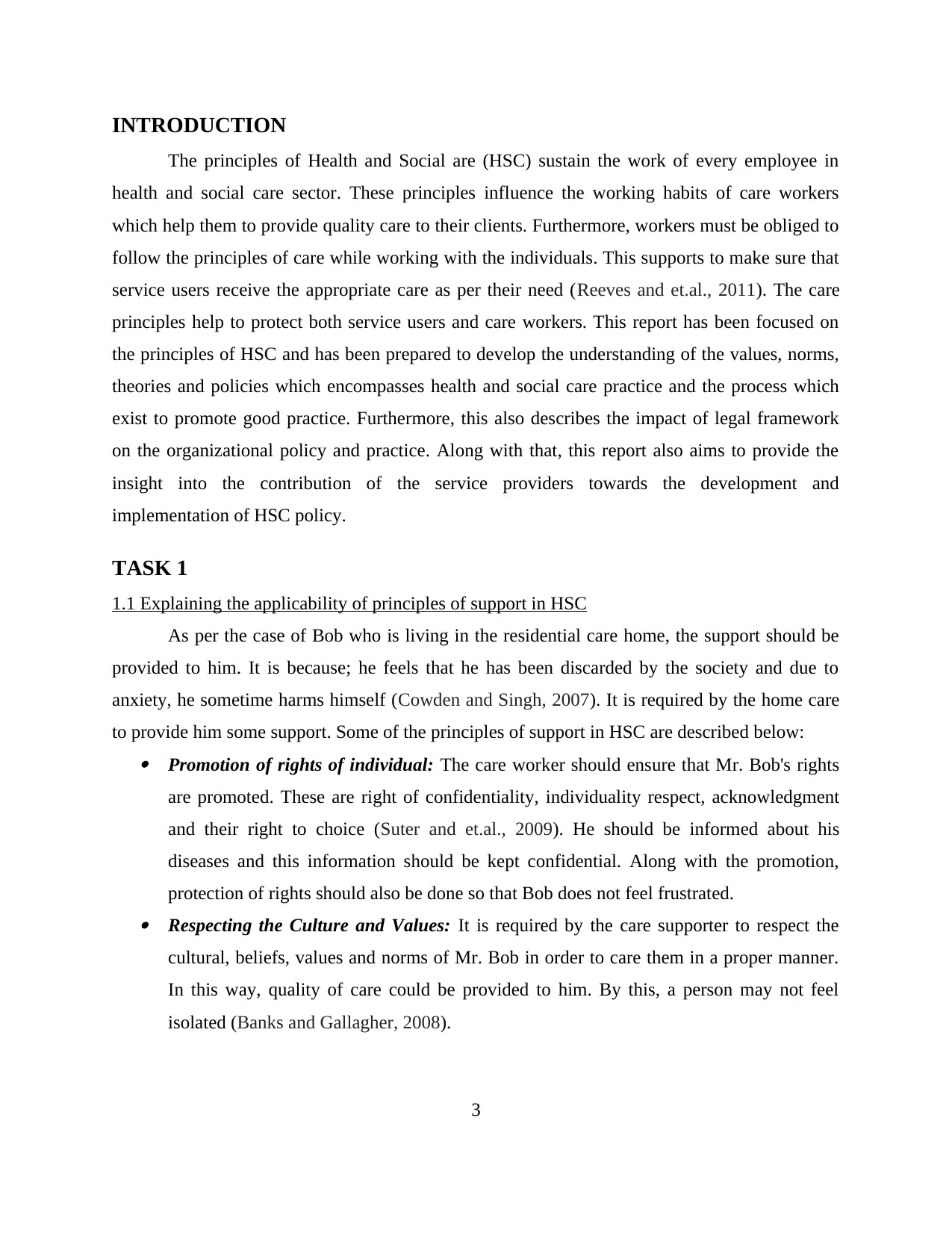
INTRODUCTION
The principles of Health and Social are (HSC) sustain the work of every employee in
health and social care sector. These principles influence the working habits of care workers
which help them to provide quality care to their clients. Furthermore, workers must be obliged to
follow the principles of care while working with the individuals. This supports to make sure that
service users receive the appropriate care as per their need (Reeves and et.al., 2011). The care
principles help to protect both service users and care workers. This report has been focused on
the principles of HSC and has been prepared to develop the understanding of the values, norms,
theories and policies which encompasses health and social care practice and the process which
exist to promote good practice. Furthermore, this also describes the impact of legal framework
on the organizational policy and practice. Along with that, this report also aims to provide the
insight into the contribution of the service providers towards the development and
implementation of HSC policy.
TASK 1
1.1 Explaining the applicability of principles of support in HSC
As per the case of Bob who is living in the residential care home, the support should be
provided to him. It is because; he feels that he has been discarded by the society and due to
anxiety, he sometime harms himself (Cowden and Singh, 2007). It is required by the home care
to provide him some support. Some of the principles of support in HSC are described below: Promotion of rights of individual: The care worker should ensure that Mr. Bob's rights
are promoted. These are right of confidentiality, individuality respect, acknowledgment
and their right to choice (Suter and et.al., 2009). He should be informed about his
diseases and this information should be kept confidential. Along with the promotion,
protection of rights should also be done so that Bob does not feel frustrated. Respecting the Culture and Values: It is required by the care supporter to respect the
cultural, beliefs, values and norms of Mr. Bob in order to care them in a proper manner.
In this way, quality of care could be provided to him. By this, a person may not feel
isolated (Banks and Gallagher, 2008).
3
The principles of Health and Social are (HSC) sustain the work of every employee in
health and social care sector. These principles influence the working habits of care workers
which help them to provide quality care to their clients. Furthermore, workers must be obliged to
follow the principles of care while working with the individuals. This supports to make sure that
service users receive the appropriate care as per their need (Reeves and et.al., 2011). The care
principles help to protect both service users and care workers. This report has been focused on
the principles of HSC and has been prepared to develop the understanding of the values, norms,
theories and policies which encompasses health and social care practice and the process which
exist to promote good practice. Furthermore, this also describes the impact of legal framework
on the organizational policy and practice. Along with that, this report also aims to provide the
insight into the contribution of the service providers towards the development and
implementation of HSC policy.
TASK 1
1.1 Explaining the applicability of principles of support in HSC
As per the case of Bob who is living in the residential care home, the support should be
provided to him. It is because; he feels that he has been discarded by the society and due to
anxiety, he sometime harms himself (Cowden and Singh, 2007). It is required by the home care
to provide him some support. Some of the principles of support in HSC are described below: Promotion of rights of individual: The care worker should ensure that Mr. Bob's rights
are promoted. These are right of confidentiality, individuality respect, acknowledgment
and their right to choice (Suter and et.al., 2009). He should be informed about his
diseases and this information should be kept confidential. Along with the promotion,
protection of rights should also be done so that Bob does not feel frustrated. Respecting the Culture and Values: It is required by the care supporter to respect the
cultural, beliefs, values and norms of Mr. Bob in order to care them in a proper manner.
In this way, quality of care could be provided to him. By this, a person may not feel
isolated (Banks and Gallagher, 2008).
3
⊘ This is a preview!⊘
Do you want full access?
Subscribe today to unlock all pages.

Trusted by 1+ million students worldwide
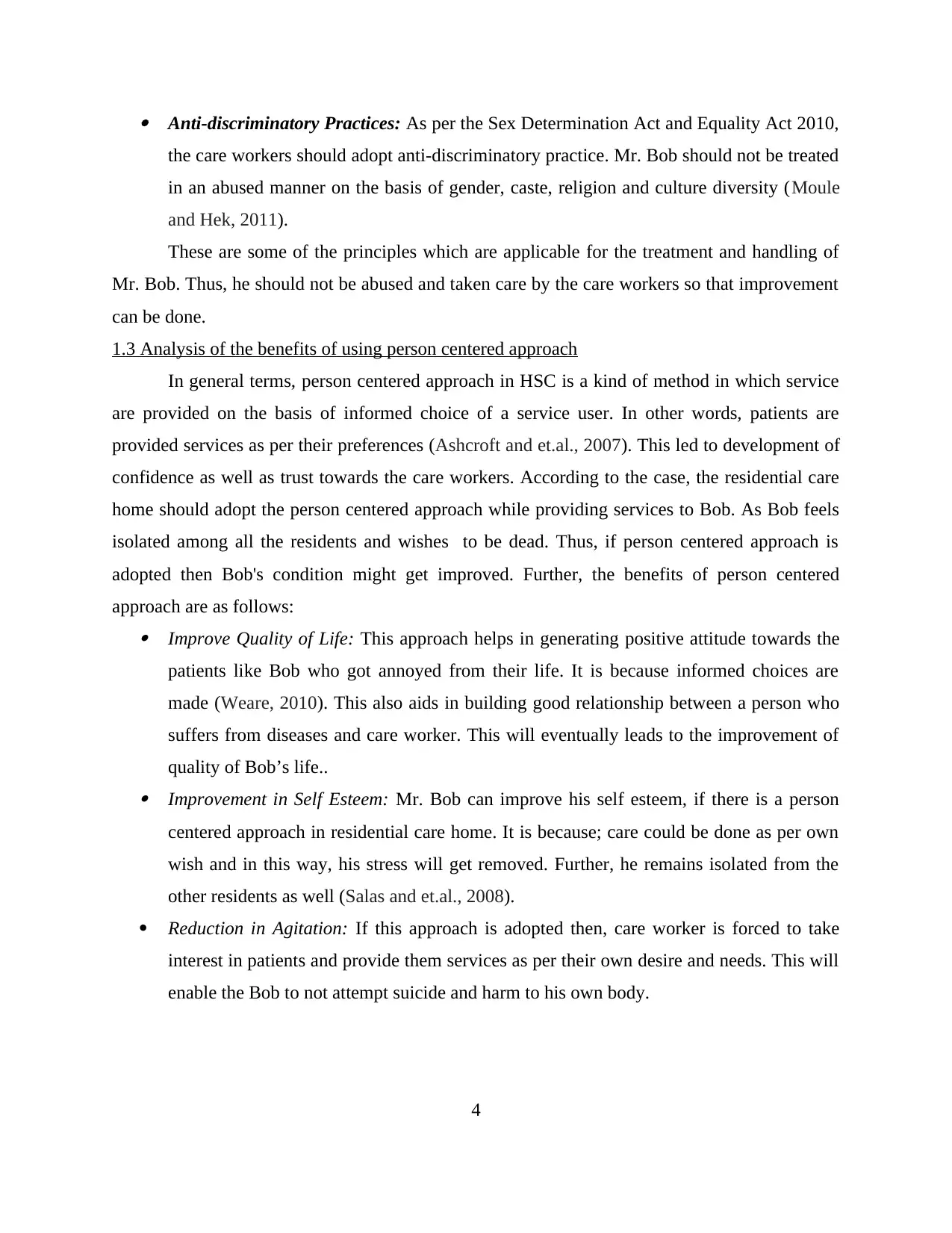
Anti-discriminatory Practices: As per the Sex Determination Act and Equality Act 2010,
the care workers should adopt anti-discriminatory practice. Mr. Bob should not be treated
in an abused manner on the basis of gender, caste, religion and culture diversity (Moule
and Hek, 2011).
These are some of the principles which are applicable for the treatment and handling of
Mr. Bob. Thus, he should not be abused and taken care by the care workers so that improvement
can be done.
1.3 Analysis of the benefits of using person centered approach
In general terms, person centered approach in HSC is a kind of method in which service
are provided on the basis of informed choice of a service user. In other words, patients are
provided services as per their preferences (Ashcroft and et.al., 2007). This led to development of
confidence as well as trust towards the care workers. According to the case, the residential care
home should adopt the person centered approach while providing services to Bob. As Bob feels
isolated among all the residents and wishes to be dead. Thus, if person centered approach is
adopted then Bob's condition might get improved. Further, the benefits of person centered
approach are as follows: Improve Quality of Life: This approach helps in generating positive attitude towards the
patients like Bob who got annoyed from their life. It is because informed choices are
made (Weare, 2010). This also aids in building good relationship between a person who
suffers from diseases and care worker. This will eventually leads to the improvement of
quality of Bob’s life.. Improvement in Self Esteem: Mr. Bob can improve his self esteem, if there is a person
centered approach in residential care home. It is because; care could be done as per own
wish and in this way, his stress will get removed. Further, he remains isolated from the
other residents as well (Salas and et.al., 2008).
Reduction in Agitation: If this approach is adopted then, care worker is forced to take
interest in patients and provide them services as per their own desire and needs. This will
enable the Bob to not attempt suicide and harm to his own body.
4
the care workers should adopt anti-discriminatory practice. Mr. Bob should not be treated
in an abused manner on the basis of gender, caste, religion and culture diversity (Moule
and Hek, 2011).
These are some of the principles which are applicable for the treatment and handling of
Mr. Bob. Thus, he should not be abused and taken care by the care workers so that improvement
can be done.
1.3 Analysis of the benefits of using person centered approach
In general terms, person centered approach in HSC is a kind of method in which service
are provided on the basis of informed choice of a service user. In other words, patients are
provided services as per their preferences (Ashcroft and et.al., 2007). This led to development of
confidence as well as trust towards the care workers. According to the case, the residential care
home should adopt the person centered approach while providing services to Bob. As Bob feels
isolated among all the residents and wishes to be dead. Thus, if person centered approach is
adopted then Bob's condition might get improved. Further, the benefits of person centered
approach are as follows: Improve Quality of Life: This approach helps in generating positive attitude towards the
patients like Bob who got annoyed from their life. It is because informed choices are
made (Weare, 2010). This also aids in building good relationship between a person who
suffers from diseases and care worker. This will eventually leads to the improvement of
quality of Bob’s life.. Improvement in Self Esteem: Mr. Bob can improve his self esteem, if there is a person
centered approach in residential care home. It is because; care could be done as per own
wish and in this way, his stress will get removed. Further, he remains isolated from the
other residents as well (Salas and et.al., 2008).
Reduction in Agitation: If this approach is adopted then, care worker is forced to take
interest in patients and provide them services as per their own desire and needs. This will
enable the Bob to not attempt suicide and harm to his own body.
4
Paraphrase This Document
Need a fresh take? Get an instant paraphrase of this document with our AI Paraphraser
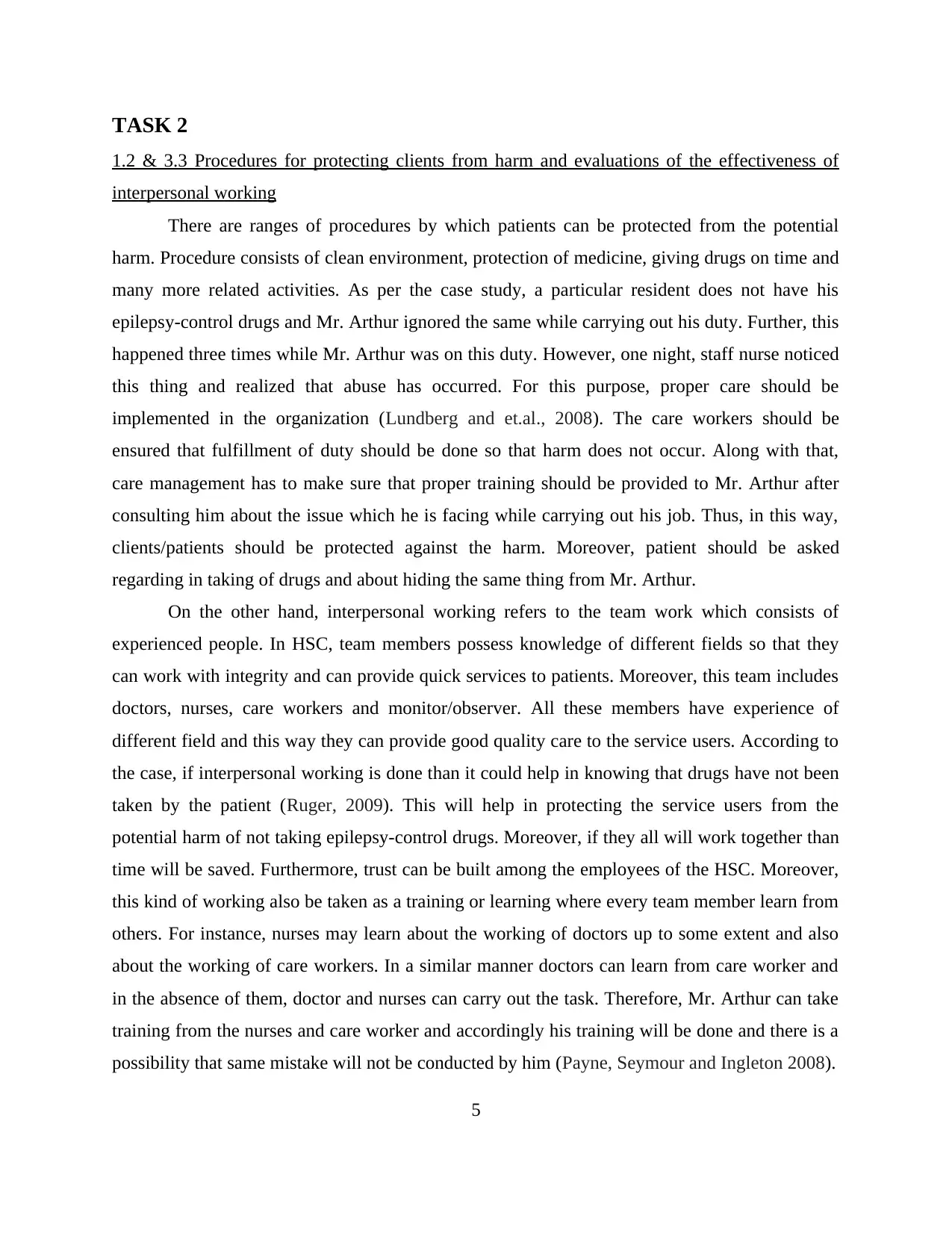
TASK 2
1.2 & 3.3 Procedures for protecting clients from harm and evaluations of the effectiveness of
interpersonal working
There are ranges of procedures by which patients can be protected from the potential
harm. Procedure consists of clean environment, protection of medicine, giving drugs on time and
many more related activities. As per the case study, a particular resident does not have his
epilepsy-control drugs and Mr. Arthur ignored the same while carrying out his duty. Further, this
happened three times while Mr. Arthur was on this duty. However, one night, staff nurse noticed
this thing and realized that abuse has occurred. For this purpose, proper care should be
implemented in the organization (Lundberg and et.al., 2008). The care workers should be
ensured that fulfillment of duty should be done so that harm does not occur. Along with that,
care management has to make sure that proper training should be provided to Mr. Arthur after
consulting him about the issue which he is facing while carrying out his job. Thus, in this way,
clients/patients should be protected against the harm. Moreover, patient should be asked
regarding in taking of drugs and about hiding the same thing from Mr. Arthur.
On the other hand, interpersonal working refers to the team work which consists of
experienced people. In HSC, team members possess knowledge of different fields so that they
can work with integrity and can provide quick services to patients. Moreover, this team includes
doctors, nurses, care workers and monitor/observer. All these members have experience of
different field and this way they can provide good quality care to the service users. According to
the case, if interpersonal working is done than it could help in knowing that drugs have not been
taken by the patient (Ruger, 2009). This will help in protecting the service users from the
potential harm of not taking epilepsy-control drugs. Moreover, if they all will work together than
time will be saved. Furthermore, trust can be built among the employees of the HSC. Moreover,
this kind of working also be taken as a training or learning where every team member learn from
others. For instance, nurses may learn about the working of doctors up to some extent and also
about the working of care workers. In a similar manner doctors can learn from care worker and
in the absence of them, doctor and nurses can carry out the task. Therefore, Mr. Arthur can take
training from the nurses and care worker and accordingly his training will be done and there is a
possibility that same mistake will not be conducted by him (Payne, Seymour and Ingleton 2008).
5
1.2 & 3.3 Procedures for protecting clients from harm and evaluations of the effectiveness of
interpersonal working
There are ranges of procedures by which patients can be protected from the potential
harm. Procedure consists of clean environment, protection of medicine, giving drugs on time and
many more related activities. As per the case study, a particular resident does not have his
epilepsy-control drugs and Mr. Arthur ignored the same while carrying out his duty. Further, this
happened three times while Mr. Arthur was on this duty. However, one night, staff nurse noticed
this thing and realized that abuse has occurred. For this purpose, proper care should be
implemented in the organization (Lundberg and et.al., 2008). The care workers should be
ensured that fulfillment of duty should be done so that harm does not occur. Along with that,
care management has to make sure that proper training should be provided to Mr. Arthur after
consulting him about the issue which he is facing while carrying out his job. Thus, in this way,
clients/patients should be protected against the harm. Moreover, patient should be asked
regarding in taking of drugs and about hiding the same thing from Mr. Arthur.
On the other hand, interpersonal working refers to the team work which consists of
experienced people. In HSC, team members possess knowledge of different fields so that they
can work with integrity and can provide quick services to patients. Moreover, this team includes
doctors, nurses, care workers and monitor/observer. All these members have experience of
different field and this way they can provide good quality care to the service users. According to
the case, if interpersonal working is done than it could help in knowing that drugs have not been
taken by the patient (Ruger, 2009). This will help in protecting the service users from the
potential harm of not taking epilepsy-control drugs. Moreover, if they all will work together than
time will be saved. Furthermore, trust can be built among the employees of the HSC. Moreover,
this kind of working also be taken as a training or learning where every team member learn from
others. For instance, nurses may learn about the working of doctors up to some extent and also
about the working of care workers. In a similar manner doctors can learn from care worker and
in the absence of them, doctor and nurses can carry out the task. Therefore, Mr. Arthur can take
training from the nurses and care worker and accordingly his training will be done and there is a
possibility that same mistake will not be conducted by him (Payne, Seymour and Ingleton 2008).
5
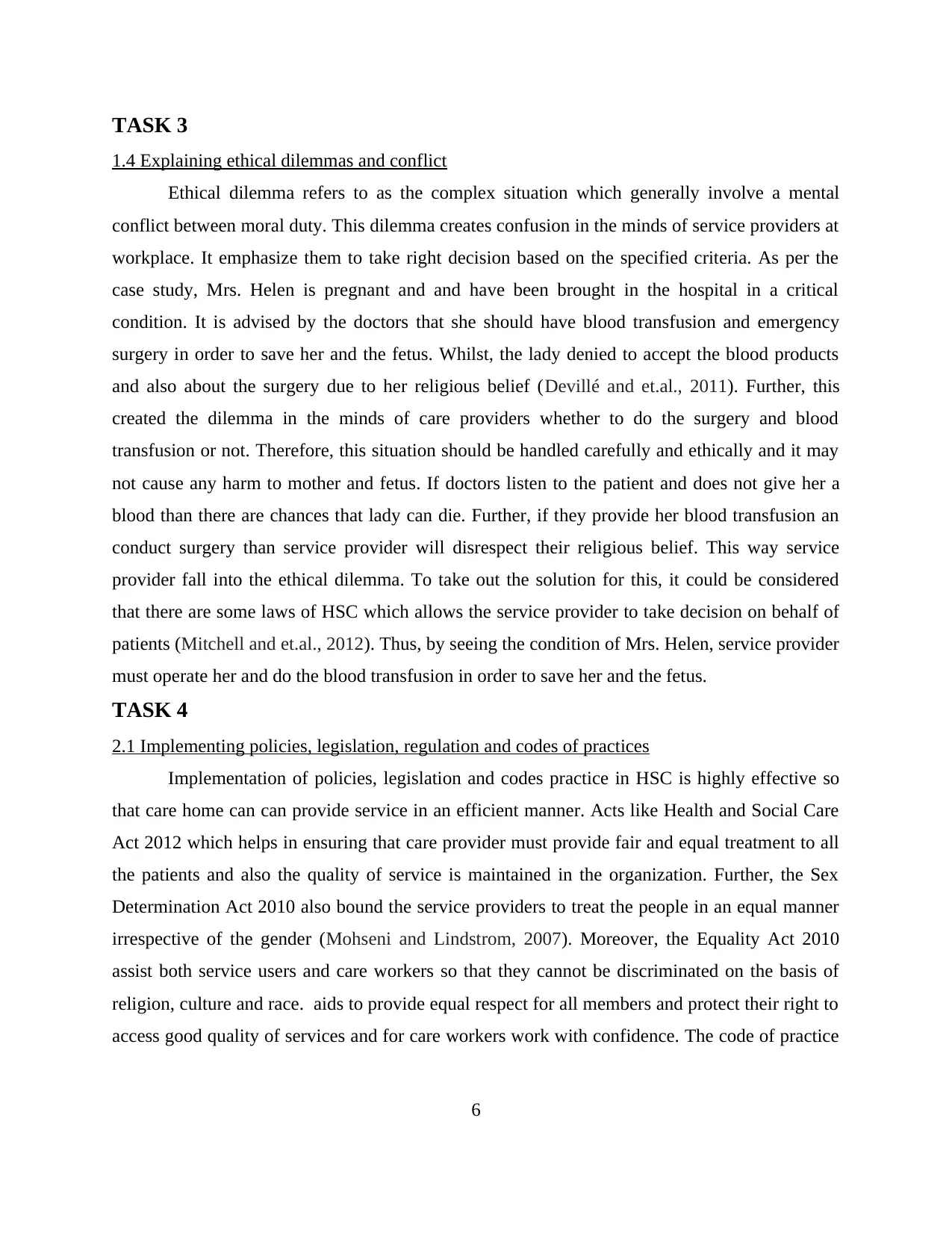
TASK 3
1.4 Explaining ethical dilemmas and conflict
Ethical dilemma refers to as the complex situation which generally involve a mental
conflict between moral duty. This dilemma creates confusion in the minds of service providers at
workplace. It emphasize them to take right decision based on the specified criteria. As per the
case study, Mrs. Helen is pregnant and and have been brought in the hospital in a critical
condition. It is advised by the doctors that she should have blood transfusion and emergency
surgery in order to save her and the fetus. Whilst, the lady denied to accept the blood products
and also about the surgery due to her religious belief (Devillé and et.al., 2011). Further, this
created the dilemma in the minds of care providers whether to do the surgery and blood
transfusion or not. Therefore, this situation should be handled carefully and ethically and it may
not cause any harm to mother and fetus. If doctors listen to the patient and does not give her a
blood than there are chances that lady can die. Further, if they provide her blood transfusion an
conduct surgery than service provider will disrespect their religious belief. This way service
provider fall into the ethical dilemma. To take out the solution for this, it could be considered
that there are some laws of HSC which allows the service provider to take decision on behalf of
patients (Mitchell and et.al., 2012). Thus, by seeing the condition of Mrs. Helen, service provider
must operate her and do the blood transfusion in order to save her and the fetus.
TASK 4
2.1 Implementing policies, legislation, regulation and codes of practices
Implementation of policies, legislation and codes practice in HSC is highly effective so
that care home can can provide service in an efficient manner. Acts like Health and Social Care
Act 2012 which helps in ensuring that care provider must provide fair and equal treatment to all
the patients and also the quality of service is maintained in the organization. Further, the Sex
Determination Act 2010 also bound the service providers to treat the people in an equal manner
irrespective of the gender (Mohseni and Lindstrom, 2007). Moreover, the Equality Act 2010
assist both service users and care workers so that they cannot be discriminated on the basis of
religion, culture and race. aids to provide equal respect for all members and protect their right to
access good quality of services and for care workers work with confidence. The code of practice
6
1.4 Explaining ethical dilemmas and conflict
Ethical dilemma refers to as the complex situation which generally involve a mental
conflict between moral duty. This dilemma creates confusion in the minds of service providers at
workplace. It emphasize them to take right decision based on the specified criteria. As per the
case study, Mrs. Helen is pregnant and and have been brought in the hospital in a critical
condition. It is advised by the doctors that she should have blood transfusion and emergency
surgery in order to save her and the fetus. Whilst, the lady denied to accept the blood products
and also about the surgery due to her religious belief (Devillé and et.al., 2011). Further, this
created the dilemma in the minds of care providers whether to do the surgery and blood
transfusion or not. Therefore, this situation should be handled carefully and ethically and it may
not cause any harm to mother and fetus. If doctors listen to the patient and does not give her a
blood than there are chances that lady can die. Further, if they provide her blood transfusion an
conduct surgery than service provider will disrespect their religious belief. This way service
provider fall into the ethical dilemma. To take out the solution for this, it could be considered
that there are some laws of HSC which allows the service provider to take decision on behalf of
patients (Mitchell and et.al., 2012). Thus, by seeing the condition of Mrs. Helen, service provider
must operate her and do the blood transfusion in order to save her and the fetus.
TASK 4
2.1 Implementing policies, legislation, regulation and codes of practices
Implementation of policies, legislation and codes practice in HSC is highly effective so
that care home can can provide service in an efficient manner. Acts like Health and Social Care
Act 2012 which helps in ensuring that care provider must provide fair and equal treatment to all
the patients and also the quality of service is maintained in the organization. Further, the Sex
Determination Act 2010 also bound the service providers to treat the people in an equal manner
irrespective of the gender (Mohseni and Lindstrom, 2007). Moreover, the Equality Act 2010
assist both service users and care workers so that they cannot be discriminated on the basis of
religion, culture and race. aids to provide equal respect for all members and protect their right to
access good quality of services and for care workers work with confidence. The code of practice
6
⊘ This is a preview!⊘
Do you want full access?
Subscribe today to unlock all pages.

Trusted by 1+ million students worldwide
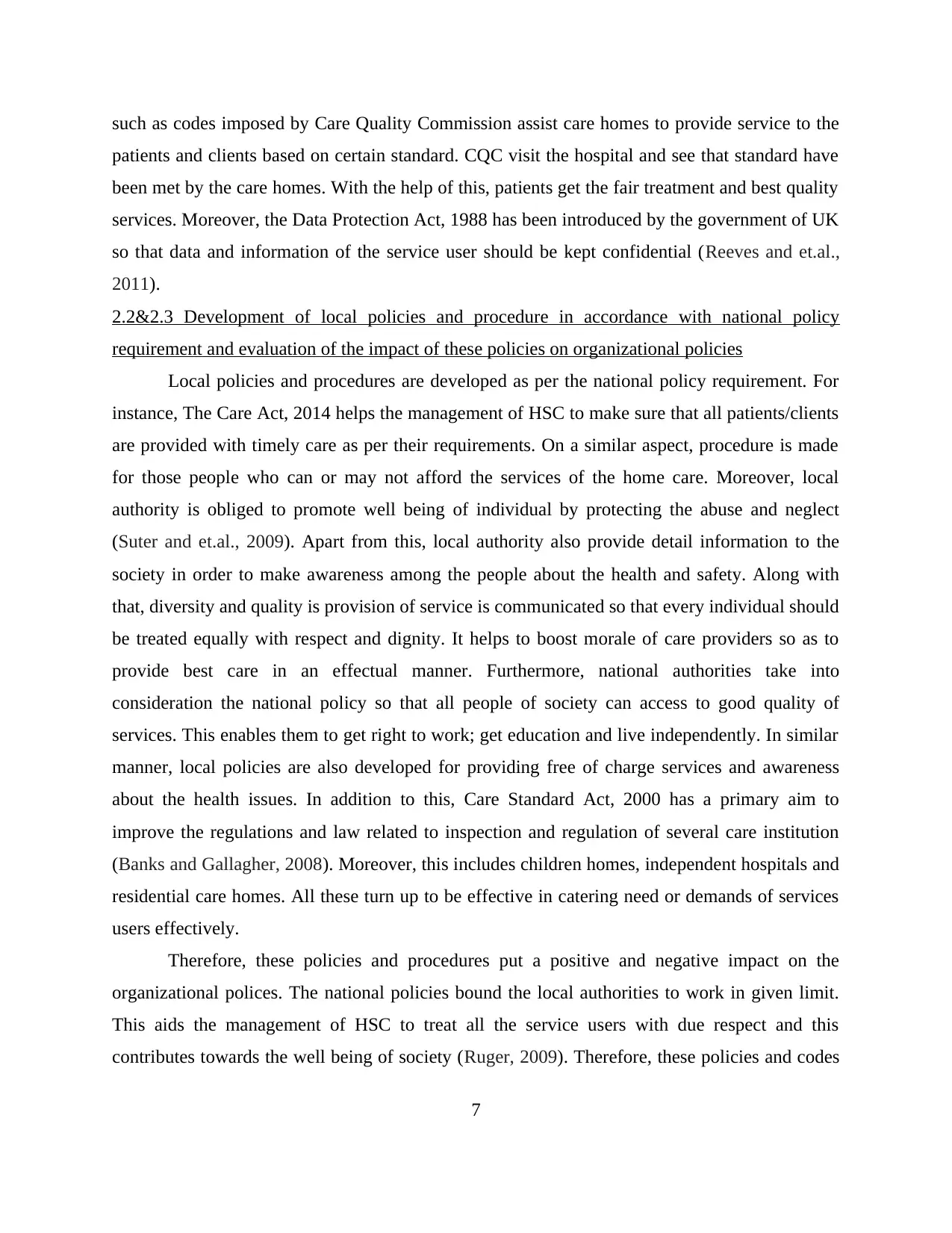
such as codes imposed by Care Quality Commission assist care homes to provide service to the
patients and clients based on certain standard. CQC visit the hospital and see that standard have
been met by the care homes. With the help of this, patients get the fair treatment and best quality
services. Moreover, the Data Protection Act, 1988 has been introduced by the government of UK
so that data and information of the service user should be kept confidential (Reeves and et.al.,
2011).
2.2&2.3 Development of local policies and procedure in accordance with national policy
requirement and evaluation of the impact of these policies on organizational policies
Local policies and procedures are developed as per the national policy requirement. For
instance, The Care Act, 2014 helps the management of HSC to make sure that all patients/clients
are provided with timely care as per their requirements. On a similar aspect, procedure is made
for those people who can or may not afford the services of the home care. Moreover, local
authority is obliged to promote well being of individual by protecting the abuse and neglect
(Suter and et.al., 2009). Apart from this, local authority also provide detail information to the
society in order to make awareness among the people about the health and safety. Along with
that, diversity and quality is provision of service is communicated so that every individual should
be treated equally with respect and dignity. It helps to boost morale of care providers so as to
provide best care in an effectual manner. Furthermore, national authorities take into
consideration the national policy so that all people of society can access to good quality of
services. This enables them to get right to work; get education and live independently. In similar
manner, local policies are also developed for providing free of charge services and awareness
about the health issues. In addition to this, Care Standard Act, 2000 has a primary aim to
improve the regulations and law related to inspection and regulation of several care institution
(Banks and Gallagher, 2008). Moreover, this includes children homes, independent hospitals and
residential care homes. All these turn up to be effective in catering need or demands of services
users effectively.
Therefore, these policies and procedures put a positive and negative impact on the
organizational polices. The national policies bound the local authorities to work in given limit.
This aids the management of HSC to treat all the service users with due respect and this
contributes towards the well being of society (Ruger, 2009). Therefore, these policies and codes
7
patients and clients based on certain standard. CQC visit the hospital and see that standard have
been met by the care homes. With the help of this, patients get the fair treatment and best quality
services. Moreover, the Data Protection Act, 1988 has been introduced by the government of UK
so that data and information of the service user should be kept confidential (Reeves and et.al.,
2011).
2.2&2.3 Development of local policies and procedure in accordance with national policy
requirement and evaluation of the impact of these policies on organizational policies
Local policies and procedures are developed as per the national policy requirement. For
instance, The Care Act, 2014 helps the management of HSC to make sure that all patients/clients
are provided with timely care as per their requirements. On a similar aspect, procedure is made
for those people who can or may not afford the services of the home care. Moreover, local
authority is obliged to promote well being of individual by protecting the abuse and neglect
(Suter and et.al., 2009). Apart from this, local authority also provide detail information to the
society in order to make awareness among the people about the health and safety. Along with
that, diversity and quality is provision of service is communicated so that every individual should
be treated equally with respect and dignity. It helps to boost morale of care providers so as to
provide best care in an effectual manner. Furthermore, national authorities take into
consideration the national policy so that all people of society can access to good quality of
services. This enables them to get right to work; get education and live independently. In similar
manner, local policies are also developed for providing free of charge services and awareness
about the health issues. In addition to this, Care Standard Act, 2000 has a primary aim to
improve the regulations and law related to inspection and regulation of several care institution
(Banks and Gallagher, 2008). Moreover, this includes children homes, independent hospitals and
residential care homes. All these turn up to be effective in catering need or demands of services
users effectively.
Therefore, these policies and procedures put a positive and negative impact on the
organizational polices. The national policies bound the local authorities to work in given limit.
This aids the management of HSC to treat all the service users with due respect and this
contributes towards the well being of society (Ruger, 2009). Therefore, these policies and codes
7
Paraphrase This Document
Need a fresh take? Get an instant paraphrase of this document with our AI Paraphraser
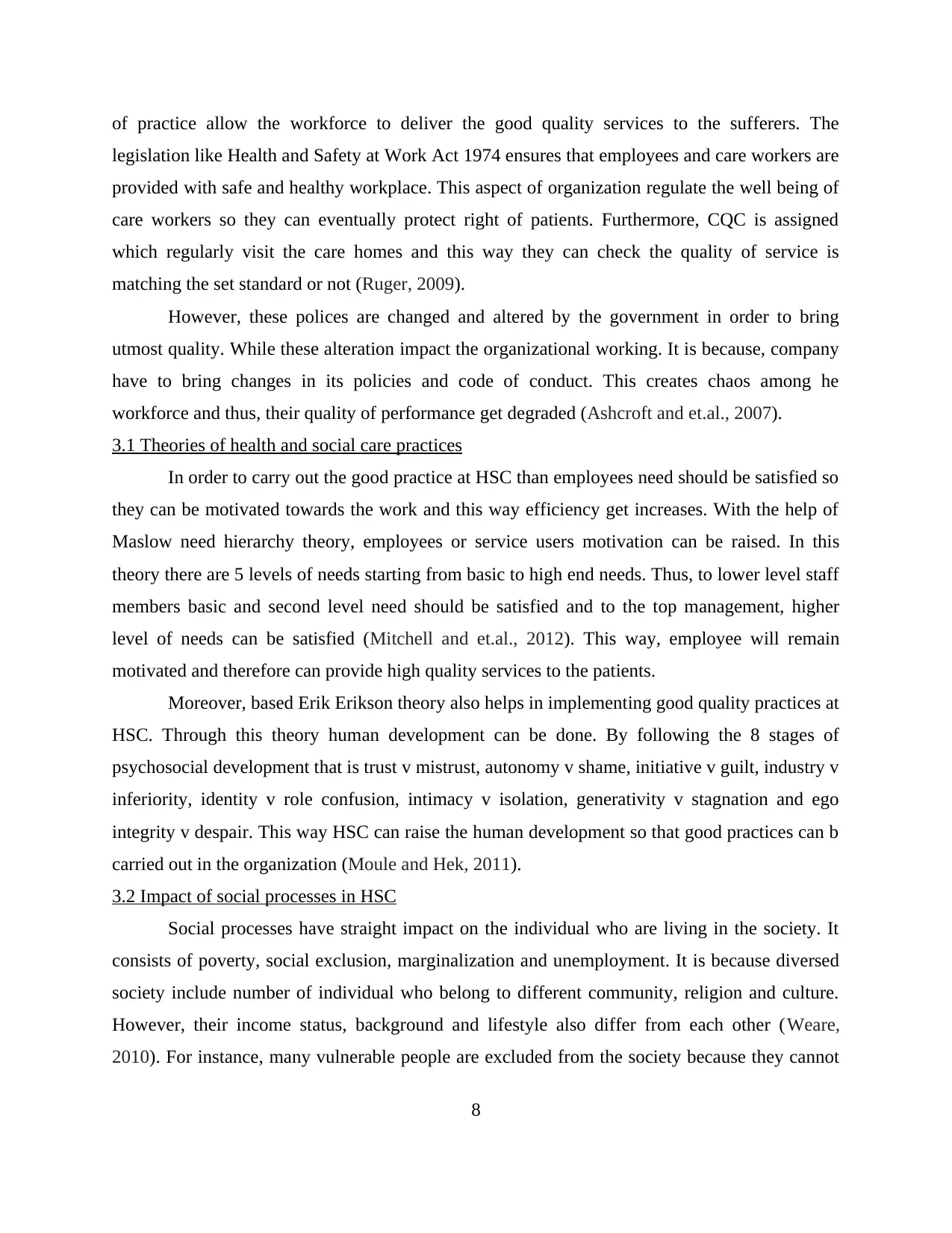
of practice allow the workforce to deliver the good quality services to the sufferers. The
legislation like Health and Safety at Work Act 1974 ensures that employees and care workers are
provided with safe and healthy workplace. This aspect of organization regulate the well being of
care workers so they can eventually protect right of patients. Furthermore, CQC is assigned
which regularly visit the care homes and this way they can check the quality of service is
matching the set standard or not (Ruger, 2009).
However, these polices are changed and altered by the government in order to bring
utmost quality. While these alteration impact the organizational working. It is because, company
have to bring changes in its policies and code of conduct. This creates chaos among he
workforce and thus, their quality of performance get degraded (Ashcroft and et.al., 2007).
3.1 Theories of health and social care practices
In order to carry out the good practice at HSC than employees need should be satisfied so
they can be motivated towards the work and this way efficiency get increases. With the help of
Maslow need hierarchy theory, employees or service users motivation can be raised. In this
theory there are 5 levels of needs starting from basic to high end needs. Thus, to lower level staff
members basic and second level need should be satisfied and to the top management, higher
level of needs can be satisfied (Mitchell and et.al., 2012). This way, employee will remain
motivated and therefore can provide high quality services to the patients.
Moreover, based Erik Erikson theory also helps in implementing good quality practices at
HSC. Through this theory human development can be done. By following the 8 stages of
psychosocial development that is trust v mistrust, autonomy v shame, initiative v guilt, industry v
inferiority, identity v role confusion, intimacy v isolation, generativity v stagnation and ego
integrity v despair. This way HSC can raise the human development so that good practices can b
carried out in the organization (Moule and Hek, 2011).
3.2 Impact of social processes in HSC
Social processes have straight impact on the individual who are living in the society. It
consists of poverty, social exclusion, marginalization and unemployment. It is because diversed
society include number of individual who belong to different community, religion and culture.
However, their income status, background and lifestyle also differ from each other (Weare,
2010). For instance, many vulnerable people are excluded from the society because they cannot
8
legislation like Health and Safety at Work Act 1974 ensures that employees and care workers are
provided with safe and healthy workplace. This aspect of organization regulate the well being of
care workers so they can eventually protect right of patients. Furthermore, CQC is assigned
which regularly visit the care homes and this way they can check the quality of service is
matching the set standard or not (Ruger, 2009).
However, these polices are changed and altered by the government in order to bring
utmost quality. While these alteration impact the organizational working. It is because, company
have to bring changes in its policies and code of conduct. This creates chaos among he
workforce and thus, their quality of performance get degraded (Ashcroft and et.al., 2007).
3.1 Theories of health and social care practices
In order to carry out the good practice at HSC than employees need should be satisfied so
they can be motivated towards the work and this way efficiency get increases. With the help of
Maslow need hierarchy theory, employees or service users motivation can be raised. In this
theory there are 5 levels of needs starting from basic to high end needs. Thus, to lower level staff
members basic and second level need should be satisfied and to the top management, higher
level of needs can be satisfied (Mitchell and et.al., 2012). This way, employee will remain
motivated and therefore can provide high quality services to the patients.
Moreover, based Erik Erikson theory also helps in implementing good quality practices at
HSC. Through this theory human development can be done. By following the 8 stages of
psychosocial development that is trust v mistrust, autonomy v shame, initiative v guilt, industry v
inferiority, identity v role confusion, intimacy v isolation, generativity v stagnation and ego
integrity v despair. This way HSC can raise the human development so that good practices can b
carried out in the organization (Moule and Hek, 2011).
3.2 Impact of social processes in HSC
Social processes have straight impact on the individual who are living in the society. It
consists of poverty, social exclusion, marginalization and unemployment. It is because diversed
society include number of individual who belong to different community, religion and culture.
However, their income status, background and lifestyle also differ from each other (Weare,
2010). For instance, many vulnerable people are excluded from the society because they cannot
8
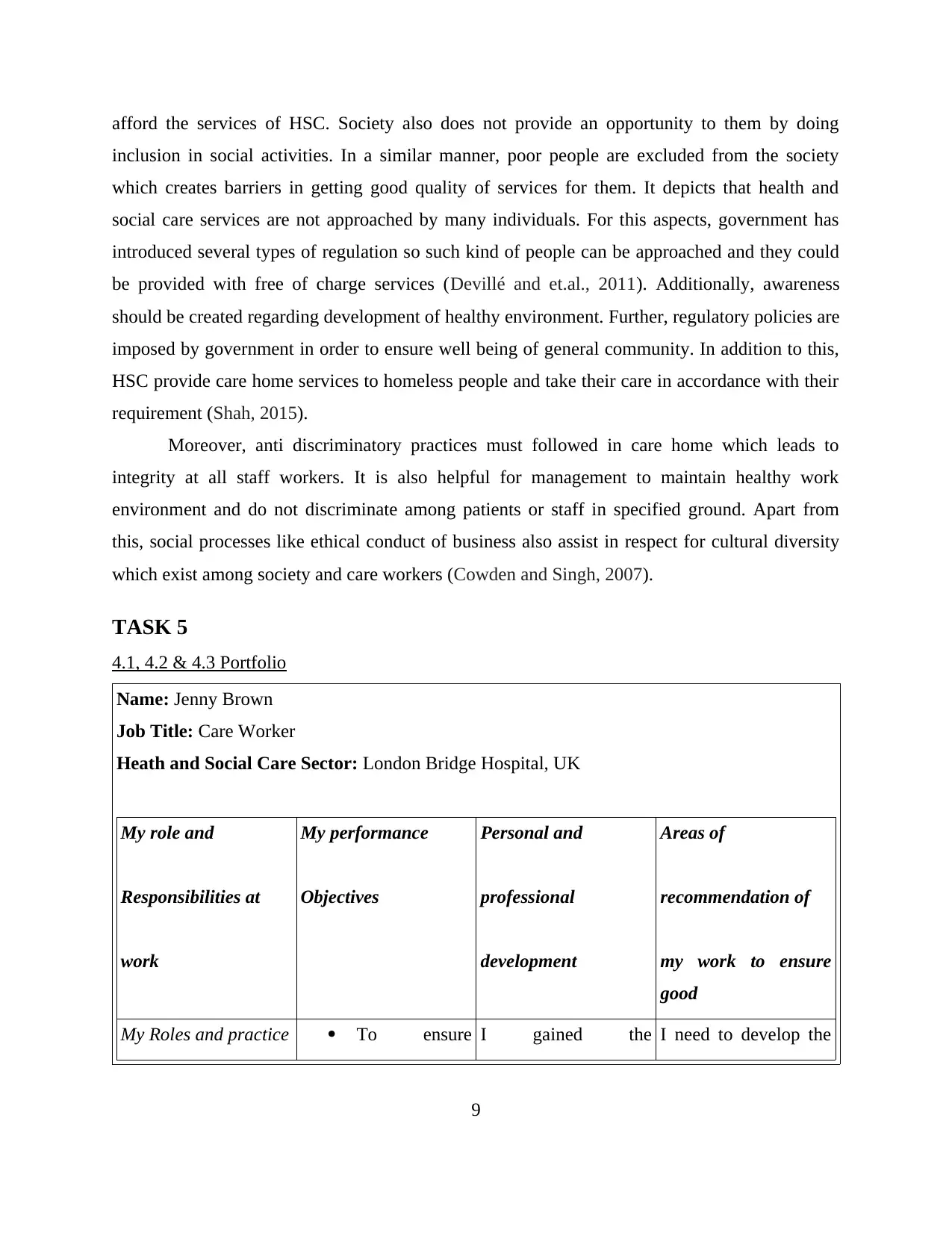
afford the services of HSC. Society also does not provide an opportunity to them by doing
inclusion in social activities. In a similar manner, poor people are excluded from the society
which creates barriers in getting good quality of services for them. It depicts that health and
social care services are not approached by many individuals. For this aspects, government has
introduced several types of regulation so such kind of people can be approached and they could
be provided with free of charge services (Devillé and et.al., 2011). Additionally, awareness
should be created regarding development of healthy environment. Further, regulatory policies are
imposed by government in order to ensure well being of general community. In addition to this,
HSC provide care home services to homeless people and take their care in accordance with their
requirement (Shah, 2015).
Moreover, anti discriminatory practices must followed in care home which leads to
integrity at all staff workers. It is also helpful for management to maintain healthy work
environment and do not discriminate among patients or staff in specified ground. Apart from
this, social processes like ethical conduct of business also assist in respect for cultural diversity
which exist among society and care workers (Cowden and Singh, 2007).
TASK 5
4.1, 4.2 & 4.3 Portfolio
Name: Jenny Brown
Job Title: Care Worker
Heath and Social Care Sector: London Bridge Hospital, UK
My role and
Responsibilities at
work
My performance
Objectives
Personal and
professional
development
Areas of
recommendation of
my work to ensure
good
My Roles and practice To ensure I gained the I need to develop the
9
inclusion in social activities. In a similar manner, poor people are excluded from the society
which creates barriers in getting good quality of services for them. It depicts that health and
social care services are not approached by many individuals. For this aspects, government has
introduced several types of regulation so such kind of people can be approached and they could
be provided with free of charge services (Devillé and et.al., 2011). Additionally, awareness
should be created regarding development of healthy environment. Further, regulatory policies are
imposed by government in order to ensure well being of general community. In addition to this,
HSC provide care home services to homeless people and take their care in accordance with their
requirement (Shah, 2015).
Moreover, anti discriminatory practices must followed in care home which leads to
integrity at all staff workers. It is also helpful for management to maintain healthy work
environment and do not discriminate among patients or staff in specified ground. Apart from
this, social processes like ethical conduct of business also assist in respect for cultural diversity
which exist among society and care workers (Cowden and Singh, 2007).
TASK 5
4.1, 4.2 & 4.3 Portfolio
Name: Jenny Brown
Job Title: Care Worker
Heath and Social Care Sector: London Bridge Hospital, UK
My role and
Responsibilities at
work
My performance
Objectives
Personal and
professional
development
Areas of
recommendation of
my work to ensure
good
My Roles and practice To ensure I gained the I need to develop the
9
⊘ This is a preview!⊘
Do you want full access?
Subscribe today to unlock all pages.

Trusted by 1+ million students worldwide
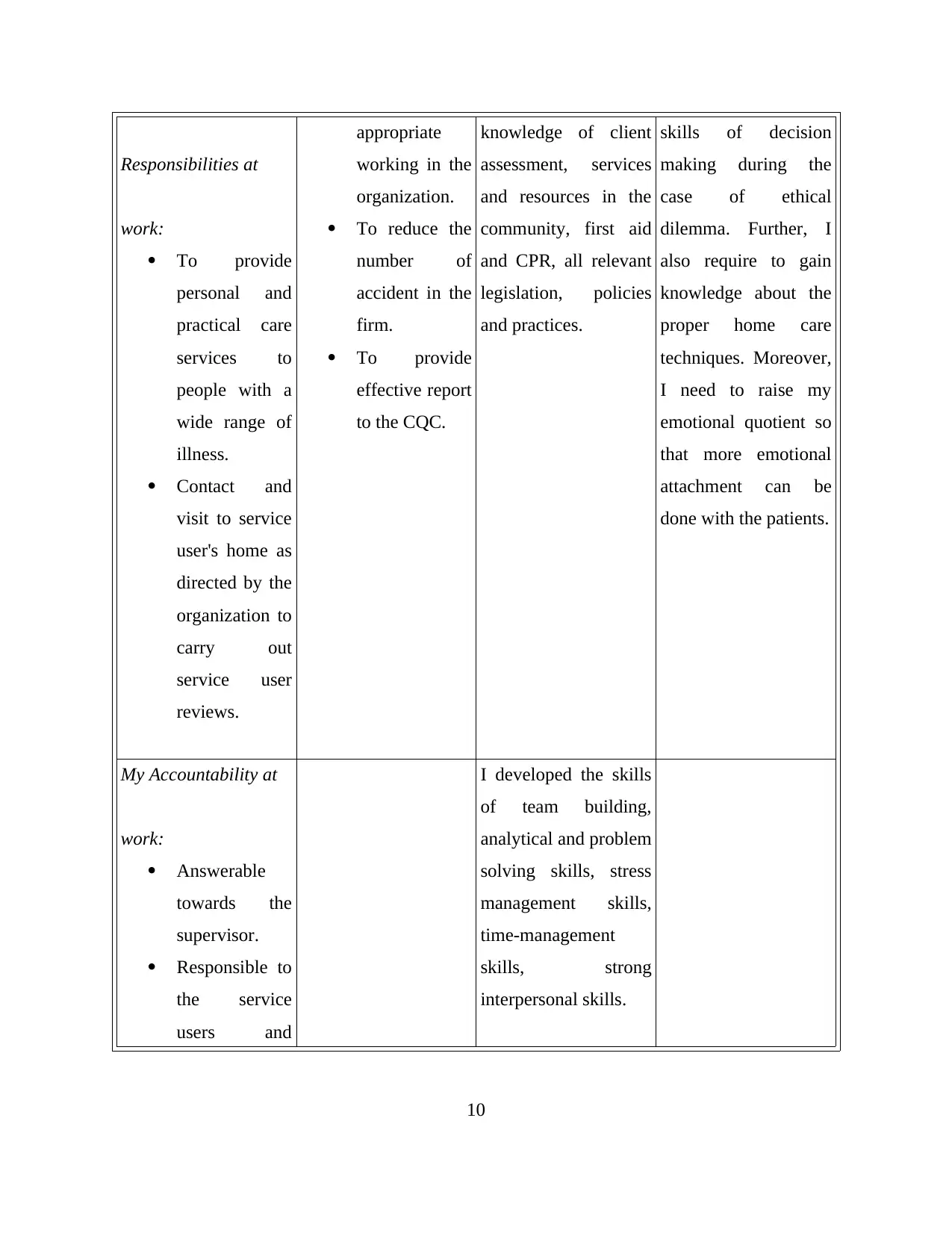
Responsibilities at
work:
To provide
personal and
practical care
services to
people with a
wide range of
illness.
Contact and
visit to service
user's home as
directed by the
organization to
carry out
service user
reviews.
appropriate
working in the
organization.
To reduce the
number of
accident in the
firm.
To provide
effective report
to the CQC.
knowledge of client
assessment, services
and resources in the
community, first aid
and CPR, all relevant
legislation, policies
and practices.
skills of decision
making during the
case of ethical
dilemma. Further, I
also require to gain
knowledge about the
proper home care
techniques. Moreover,
I need to raise my
emotional quotient so
that more emotional
attachment can be
done with the patients.
My Accountability at
work:
Answerable
towards the
supervisor.
Responsible to
the service
users and
I developed the skills
of team building,
analytical and problem
solving skills, stress
management skills,
time-management
skills, strong
interpersonal skills.
10
work:
To provide
personal and
practical care
services to
people with a
wide range of
illness.
Contact and
visit to service
user's home as
directed by the
organization to
carry out
service user
reviews.
appropriate
working in the
organization.
To reduce the
number of
accident in the
firm.
To provide
effective report
to the CQC.
knowledge of client
assessment, services
and resources in the
community, first aid
and CPR, all relevant
legislation, policies
and practices.
skills of decision
making during the
case of ethical
dilemma. Further, I
also require to gain
knowledge about the
proper home care
techniques. Moreover,
I need to raise my
emotional quotient so
that more emotional
attachment can be
done with the patients.
My Accountability at
work:
Answerable
towards the
supervisor.
Responsible to
the service
users and
I developed the skills
of team building,
analytical and problem
solving skills, stress
management skills,
time-management
skills, strong
interpersonal skills.
10
Paraphrase This Document
Need a fresh take? Get an instant paraphrase of this document with our AI Paraphraser
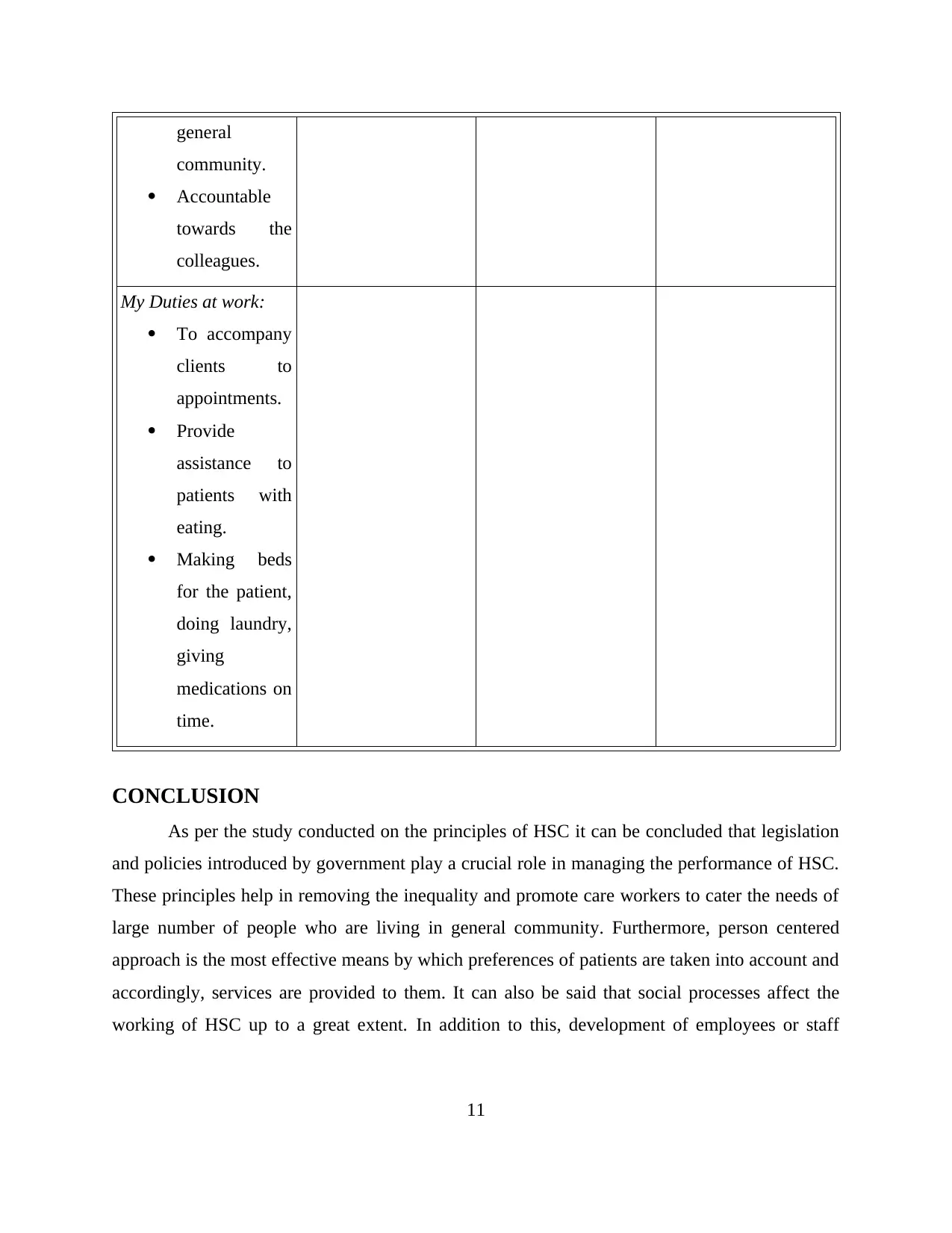
general
community.
Accountable
towards the
colleagues.
My Duties at work:
To accompany
clients to
appointments.
Provide
assistance to
patients with
eating.
Making beds
for the patient,
doing laundry,
giving
medications on
time.
CONCLUSION
As per the study conducted on the principles of HSC it can be concluded that legislation
and policies introduced by government play a crucial role in managing the performance of HSC.
These principles help in removing the inequality and promote care workers to cater the needs of
large number of people who are living in general community. Furthermore, person centered
approach is the most effective means by which preferences of patients are taken into account and
accordingly, services are provided to them. It can also be said that social processes affect the
working of HSC up to a great extent. In addition to this, development of employees or staff
11
community.
Accountable
towards the
colleagues.
My Duties at work:
To accompany
clients to
appointments.
Provide
assistance to
patients with
eating.
Making beds
for the patient,
doing laundry,
giving
medications on
time.
CONCLUSION
As per the study conducted on the principles of HSC it can be concluded that legislation
and policies introduced by government play a crucial role in managing the performance of HSC.
These principles help in removing the inequality and promote care workers to cater the needs of
large number of people who are living in general community. Furthermore, person centered
approach is the most effective means by which preferences of patients are taken into account and
accordingly, services are provided to them. It can also be said that social processes affect the
working of HSC up to a great extent. In addition to this, development of employees or staff
11
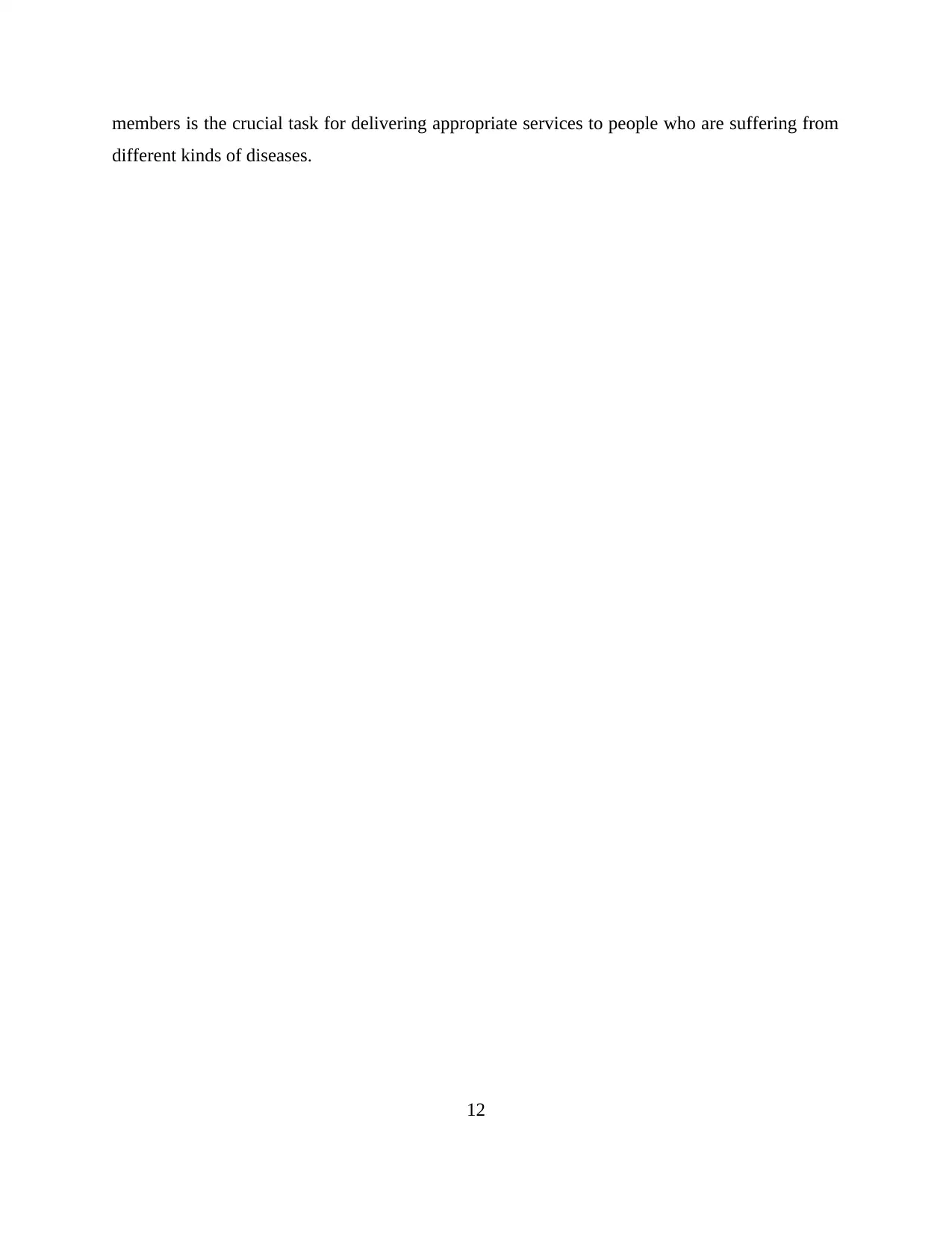
members is the crucial task for delivering appropriate services to people who are suffering from
different kinds of diseases.
12
different kinds of diseases.
12
⊘ This is a preview!⊘
Do you want full access?
Subscribe today to unlock all pages.

Trusted by 1+ million students worldwide
1 out of 14
Related Documents
Your All-in-One AI-Powered Toolkit for Academic Success.
+13062052269
info@desklib.com
Available 24*7 on WhatsApp / Email
![[object Object]](/_next/static/media/star-bottom.7253800d.svg)
Unlock your academic potential
Copyright © 2020–2026 A2Z Services. All Rights Reserved. Developed and managed by ZUCOL.





